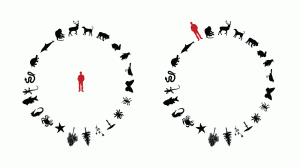Think about the neuroscience of emotion, an incredibly complex process involving the combination of internal stimuli from the body, external stimuli from surroundings, and past experiences to guide behavior. As you considered this concept, did you think about it in the context of a human, potentially even how it related to yourself? Although the neuroscience of emotion is an important process across species, people tend to focus on humans when thinking of this concept, as well as other biology concepts. This anthropocentric way of thinking, and how it may increase the prevalence of misconceptions in biology education, is the research focus of 5th-year CORE lab doctoral student, Catie Nielson.
Although the neuroscience of emotion is an important process across species, people tend to focus on humans when thinking of this concept, as well as other biology concepts.
Anthropocentric thinking, a cognitive construal studied in the CORE lab, is a way of thinking that puts humans at the center of our understanding of the natural world. This type of thinking can manifest in many ways in biology education, such as using human analogies to explain non-human concepts, believing that humans are unique and superior to the rest of nature, and attributing human properties to non-human entities. While relating nature to human experiences may make complex biology concepts easier to understand in some contexts, past research in the CORE lab has also found a connection between anthropocentric thinking and misconceptions. Building on this past work, Catie’s research has implications for how biology education can be presented in a way to students that reduces misconceptions.

In order to test how anthropocentric language impact students’ biology misconceptions, Catie has designed an online study for undergraduates at Northeastern. Participants read a passage about one of two biology concepts: neuroscience of emotion or antibiotic resistance. Those in the control group read a passage that does not use human-specific language, while those in the active group read a passage that uses human examples to explain the concept. All participants are then asked to explain the concept in their own words; afterwards, the participants’ responses are analyzed for their accuracy, the presence of misconceptions, and the presence of anthropocentrism.
The participants also complete measures of human exceptionalism, the idea that humans are discontinuous and superior to the rest of the natural world. For example, they are given a list of different species ranging from insects to primates and asked which share a common ancestor with humans. All species share a common ancestor with humans, but anthropocentrist thought may lead participants to choose none of the species, or only those they consider most “human-like,” such as primates.
All species share a common ancestor with humans, but anthropocentrist thought may lead participants to choose none of the species, or only those they consider most “human-like,” such as primates.
The preliminary results find that those who display human exceptionalism on the common ancestor task are more likely to include exceptionalist ideas in their free responses. This finding did not differ between the treatment and control groups, suggesting that what matters is the extent of preexisting anthropocentrism in participants coming to the test, rather than whether humans are focused on in explanations. Catie and her team are actively working on analyzing responses to obtain more results for the study.
Catie is also curious about the implications of this research and is considering next steps for the project. She wonders how the use of anthropocentrism in biology education may have to do with using familiar concepts to relate to new ones. She is also planning on running a follow-up study to see how a reading intervention, addressing the common misconceptions found in this study, may be a way to advance students’ biological understanding.
What matters is the extent of preexisting anthropocentrism in participants coming to the test, rather than whether humans are focused on in explanations.